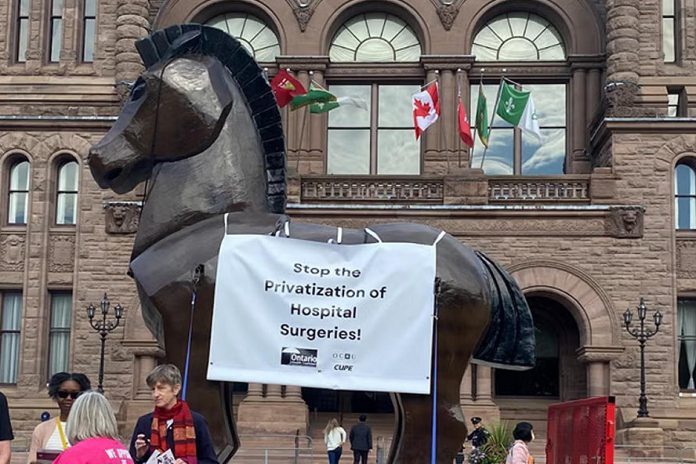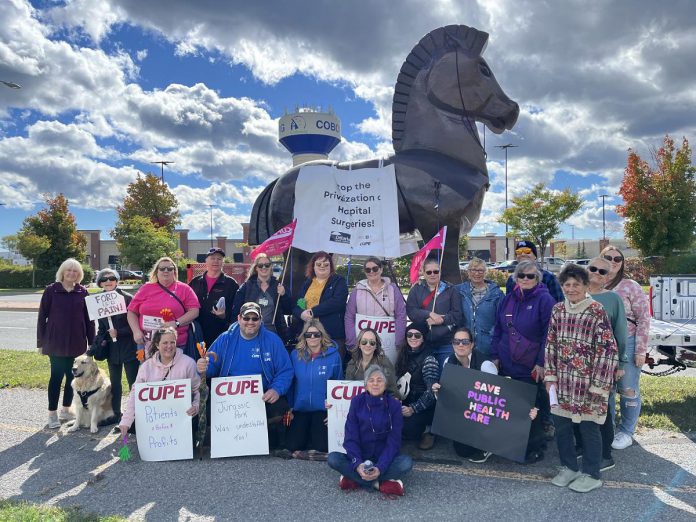
A 15-foot horse statue will be visiting three hospitals in the Kawarthas region on Wednesday (October 16) as part of a province-wide protest by CUPE’s Ontario Council of Hospital Unions (OCHU-CUPE) and the Ontario Health Coalition about the Ontario government’s use of privately owned clinics to deliver publicly funded health care services.
The statue — a replica of the Trojan horse from Greek mythology — will be at Campbellford Memorial Hospital at 9 a.m., Peterborough Regional Health Centre at 11:30 a.m., and Ross Memorial Hospital in Lindsay at 3 p.m. The statue already visited Northumberland Hills Hospital in Cobourg last Tuesday (October 8).
For those unfamiliar with the Trojan horse myth, the Greeks are said to have built a gigantic wooden house as a tribute to the city of Troy in an admission of defeat after an unsuccessful 10-year siege of the city during the legendary Trojan War in the 12th century B.C. The Greek army then pretended to sail away, and the jubilant Trojans pulled the wooden horse into their city as a victory trophy, unaware the Greeks had hidden a large group of warriors inside the horse. The Greeks then emerged from the wooden horse at night and opened the city gates for the rest of the Greek army to enter and destroy Troy, ending the war.
OCHU-CUPE is using the Trojan horse statue as a metaphor for the Ontario government’s plan to issue new licenses to for-profit clinics this fall.
“The Trojan Horse represents a gift, which, if accepted, threatens the recipient,” said OCHU-CUPE president Michael Hurley in a media release. “The false promise here is that privatizing surgeries is a solution to long waits.”
“In fact, privatization redirects money and staff from public hospitals to private, for-profit clinics. As a result, wait-times in the public system get longer as staff shortages lead to service closures. Meanwhile, these private clinics charge out-of-pocket costs, which are unaffordable for most people. Ultimately, they will reduce access based on need, lengthen wait times, and weaken our public hospital system.”

In January 2023, Ontario Premier Doug Ford first announced his government’s plan to move tens of thousands of publicly funded cataract surgeries, hip and knee replacements, MRIs, CT scans, colonoscopies, and endoscopies out of hospitals and into for-profit and not-for-profit community facilities.
“We aren’t accepting a status quo that leaves too many people waiting too long for care,” Ontario health minister Sylvia Jones said at the time, adding that such services would “always be paid for with your OHIP card, never a credit card.”
Ontario already has more than 900 private clinics, many predating the Ford government, that mainly provide publicly funded X-rays and other diagnostic services. Seven clinics currently provide MRI or CT scans or both. In 2023, four new clinics opened to provide cataract surgeries for around 14,000 patients who have been on waiting lists that grew during the pandemic. According to OCHU-CUPE, the province will be issuing new licenses this fall to private clinics and providing them with funding to perform 100,000 MRIs and CT scans.
Critics have argued that moving publicly funded health care services into for-profit clinics will result in the over-billing of patients as well as the “upselling” of patients to encourage them to pay out-of-pocket for add-on services (such as an upgraded lens in a cataract surgery), and will result in a lower standard of care as clinics process patients as quickly as possible and cut corners to maximize profit.
Hurley said a recent study published in the Canadian Medical Association Journal showed that surgical rates for cataract surgeries went up by 22 per cent for the wealthiest people in Ontario while decreasing by nine per cent for the lowest income-earners.
According to an April report from the Ontario Health Coalition, private clinics are illegally billing patients up to $8,000 for medically necessary services in violation of the Canada Health Act.
“Private for-profit clinics and hospitals are up to two to three times more expensive than public hospitals,” said Ontario Health Coalition executive director Natalie Mehra in a media release.
“The Ford government is taking our public tax funding for health care away from our local hospitals to give it to more costly for-profit clinics. Even worse, for-profit clinics threaten public medicare and cause hardship for patients, charging the elderly on pensions thousands of dollars unlawfully for needed surgeries and manipulating them to pay for unnecessary add-ons.”
The Ontario Health Coalition and OCHU-CUPE, which represents about 50,000 hospital and long-term care workers in Ontario, are demanding the province invest more funds in public hospitals to improve staffing and capacity and allow hospitals to deliver needed services instead of private clinics.
“Ontario now funds our public hospitals at the lowest rate in Canada, with the lowest staffing levels and bed capacity across the country,” said OCHU-CUPE secretary-treasurer Sharon Richer. “Yet, the Ontario Conservatives are shifting more than a billion dollars per year away from our public hospitals to private for-profit clinics, hospitals and staffing agencies.”
“The solution is to add enough new hospital beds and staff over the next 10 years to meet the needs of an aging and growing population. The government must also close the loopholes that exempt some occupations from paying the health tax would generate more than enough revenue to offset these costs.”
Following the visits to hospitals in the Kawarthas, OCHU-CUPE and the Ontario Health Coalition will be continuing their Trojan horse tour to another 50 locations across Ontario until the end of November. The tour will also be in Minden and Haliburton on November 28.


























